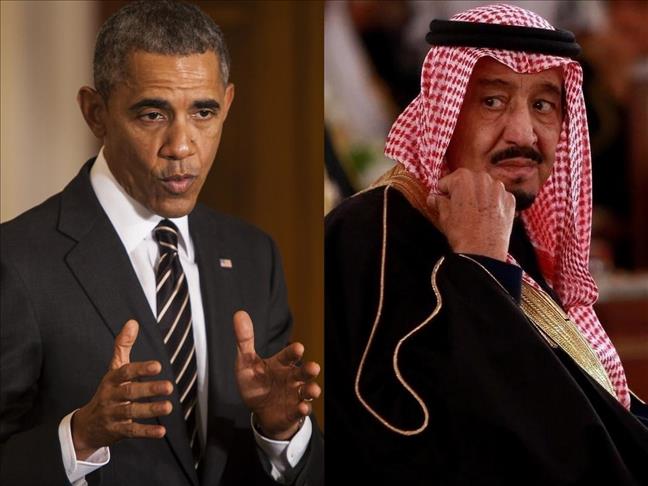Saudi king to seek restrictions on Iran’s influence
Washington visit will be 'an important visit at an important time,' says White House official

By Michael Hernandez
WASHINGTON
Saudi King Salman bin Abdulaziz al Saud will meet President Barack Obama on Friday as Riyadh seeks further assurances from Washington about Iran’s regional influence.
Friday's meeting will be "an important visit at an important time," Beh Rhodes, Obama’s deputy national security advisor told reporters.
Salman’s visit, his first to Washington as king, comes in the wake of a recently brokered nuclear agreement between Iran and world powers that has stoked suspicions in the kingdom and its Gulf allies that the world community is turning a blind eye to Tehran’s clout, and in some cases, enabling its growth.
Obama last met with the Saudi leader when he visited the kingdom in January in the midst of heated negotiations on the accord.
Since then, international negotiators from the P5+1 group of world powers and Iran agreed to remove biting economic sanctions from Tehran in exchange for unprecedented curbs and inspections of its nuclear program.
The international agreement "raises a lot of issues that make this timely," said Anthony Cordesman, the Arleigh A. Burke chair in Strategy at the Center for Strategic and International Studies.
"Certainly he is going to be looking for reassurance from the United States that it will enforce the nuclear agreement and ensure that Iran is pushed into complying with all of its terms, as well as being ready to deal with any violation," Cordesman said of Salman.
Saudi Arabia, like other Gulf countries, has opted to cautiously welcome the agreement, but is seeking additional security and military cooperation from the U.S. in return.
"They feel that they need more reassurances, more cooperation, more commitments from the U.S.," said Paul Salem, vice president for policy and research at the Middle East Institute.
What form those additional guarantees might take is unclear.
On the list for Riyadh will likely be a new missile defense system, "particularly the options for moving toward a better structured and integrated theater missiles defense as distinguished from the kind of point defense that exist today," Cordesman said.
Theater systems have operational areas that encompass regions rather than localized areas.
Obama will also likely be seeking endorsement of the Iran deal from the Saudis in exchange for a new security pledge.
Beyond the geopolitical implications of the Iran nuclear deal, Obama and Salman are likely to tackle Riyadh’s ongoing campaign against Iranian-backed Houthi rebels in Yemen, and the conflict in Syria where Iran and its allies continue to bolster Syrian President Bashar al-Assad.
Regarding Yemen, Obama may seek to receive guarantees as to the extent of the kingdom’s operations in the impoverished war-torn nation, said Amr al-Azm, professor of Middle East history and anthropology at Shawnee State University.
"I think the Americans will want some kind of guarantees, or indication of, how far the Saudis are planning to take this," he said. "I’m thinking here in terms of the complete annihilation of the Houthis as opposed to simply defeating them."
The campaign to reseat ousted Yemeni President Abd Rabbuh Manur Hadi after Houthi rebels deposed him in March has further torn apart the country. It shows no sign of relenting any time soon.
In Syria, Saudi Arabia and the U.S. have significant differences about which groups to support on the country's increasingly complex battlefield, with Washington weary of some militant groups that Riyadh has chosen to support, namely the Sunni Islamist groups Ahrar ash-Sham and Jaish al-Fatah.
"Some of those groups are too radical for the Americans' liking," said Azm.
Saudi Arabia will likely push for the Americans to pursue a no-fly zone in northern Syria, he added.
Washington has so far resisted the idea as officials have insisted that a de facto one already exists in the north of the country where only coalition aircraft fly.
Rather than further enmesh Washington in additional Middle East wars, Obama has sought additional cooperation with regional allies to address conflicts that often become embroiled in regional, ethnic and sectarian interests.
Syria and the fight against Daesh are no exception.
"The Saudis have always been clear: they want to ensure that Iran’s influence in the region is contained," Azm said. "On the contrary, what we see is even more [desire] on the administration’s part to give even more space for the Iranians to lead. They want them as partners in the war against ISIS for example, and I think that’s what they’re going to try to push back on."
U.S. Secretary of State John Kerry said Wednesday that he was confident Mideast powers would send a regional force to Syria to help defeat Daesh, but said Obama continues to rule out the use of American troops there.
Whether longtime regional foes Iran and Saudi Arabia can jointly participate in such a venture appears to be a longshot.
But with the international community gathering at the United Nations later this month, there may be a unique opportunity to, if not achieve the far-flung notion, make steps toward greater cooperation as the Syrian conflict drags into its fifth year.
Anadolu Agency website contains only a portion of the news stories offered to subscribers in the AA News Broadcasting System (HAS), and in summarized form. Please contact us for subscription options.

